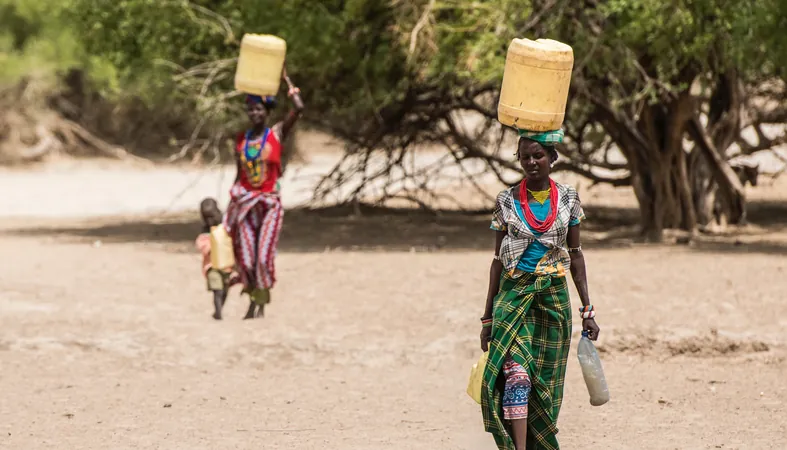
Unlocking the Secrets of Survival: How the Turkana People Thrive in Kenya's Harsh Deserts
2025-09-18
Author: Wei Ling
The Remarkable Adaptation of the Turkana
In the blistering heat of Northwest Kenya, the nomadic Turkana people showcase an extraordinary ability to thrive in one of Earth’s most arid regions. With sparse vegetation forcing them to rely heavily on animal products such as milk, meat, and blood from camels and goats, their diet is uniquely tailored to their environment.
A Groundbreaking Genetic Study
A recent genetic study conducted by researchers from UC Berkeley and Vanderbilt University, in collaboration with local Kenyan scientists and the Turkana community, delves into the genetic adaptations that have enabled the Turkana to endure extreme desert conditions for millennia. However, these very adaptations can lead to serious health issues as they transition to urban lifestyles, ready to face the modern challenges of city living.
"The Turkana have maintained their traditional way of life for thousands of years, providing us with an extraordinary window into human adaptation," said UC Berkeley's Julien Ayroles. "The genes that helped them survive harsh environments may become maladapted in urban settings, causing health issues—a phenomenon known as evolutionary mismatch."
Unique Genetic Advantages and Health Risks
One fascinating discovery is a genetic variation that enhances kidney function, allowing the Turkana to conserve water more effectively. This adaptation is crucial not only for surviving in such a dry climate but also for processing their protein-rich diet.
"If a person not from the Turkana tried their meat-heavy diet, we would likely experience severe health issues quickly," Ayroles explained. "This community, however, has developed a unique tolerance over generations."
Impacts on Global Health
The study has significant implications for traditional cultures worldwide that are grappling with rapid environmental changes or shifting to modern lifestyles. Such evolutionary mismatches are suspected contributors to rising lifestyle diseases like diabetes and heart disease.
Vanderbilt University's Amanda Lea noted, "Our findings offer new models to understand how the environments we live in today mesh with our ancestral adaptations—and how that dynamics can impact disease risk. "
Engaging the Turkana Community in Health Education
To make the findings accessible, Ayroles and his team are launching a podcast in the Turkana language, designed to educate the community on the health challenges that arise from their shifting lifestyle. This initiative aims to merge scientific research with community knowledge, helping to guide health programs as the Turkana adapt to urban life.
Life in a Harsh Climate
The Turkana homeland is an unforgiving landscape, bordering Lake Turkana with temperatures soaring past 122°F. Securing water for themselves and their herds is a daily struggle, often requiring hours of travel through barren terrain.
Despite their limited water intake—just 1.5 liters a day, one-quarter of what outsiders need—the Turkana have been shown to be largely free from chronic diseases. "It's a paradox; about 90% of those assessed were chronically dehydrated yet generally healthy," Ayroles noted.
The Quest for Knowledge
The study involved examining the genomes of over 5,000 Turkana individuals, with a focus on those still living as nomadic herders, as well as those who have settled in urban settings. The research uncovered specific genetic markers that have evolved, enabling the Turkana to adapt successfully to their unique environmental challenges.
As urban lifestyles take hold, findings suggest that certain markers indicate a predisposition to diseases like hypertension and kidney dysfunction.
Empowering Turkana Voices in Genomic Research
This groundbreaking work not only advances genomic research but also empowers the Turkana people, historically underrepresented in this science. "Their insights have been crucial in linking our genetic findings to real-world applications," said Sospeter Ngoci Njeru, a leader in this study.
By placing the Turkana at the forefront of genomic studies, researchers hope to pave the way for better health management strategies that respect their unique heritage and evolving lifestyle.



 Brasil (PT)
Brasil (PT)
 Canada (EN)
Canada (EN)
 Chile (ES)
Chile (ES)
 Česko (CS)
Česko (CS)
 대한민국 (KO)
대한민국 (KO)
 España (ES)
España (ES)
 France (FR)
France (FR)
 Hong Kong (EN)
Hong Kong (EN)
 Italia (IT)
Italia (IT)
 日本 (JA)
日本 (JA)
 Magyarország (HU)
Magyarország (HU)
 Norge (NO)
Norge (NO)
 Polska (PL)
Polska (PL)
 Schweiz (DE)
Schweiz (DE)
 Singapore (EN)
Singapore (EN)
 Sverige (SV)
Sverige (SV)
 Suomi (FI)
Suomi (FI)
 Türkiye (TR)
Türkiye (TR)
 الإمارات العربية المتحدة (AR)
الإمارات العربية المتحدة (AR)